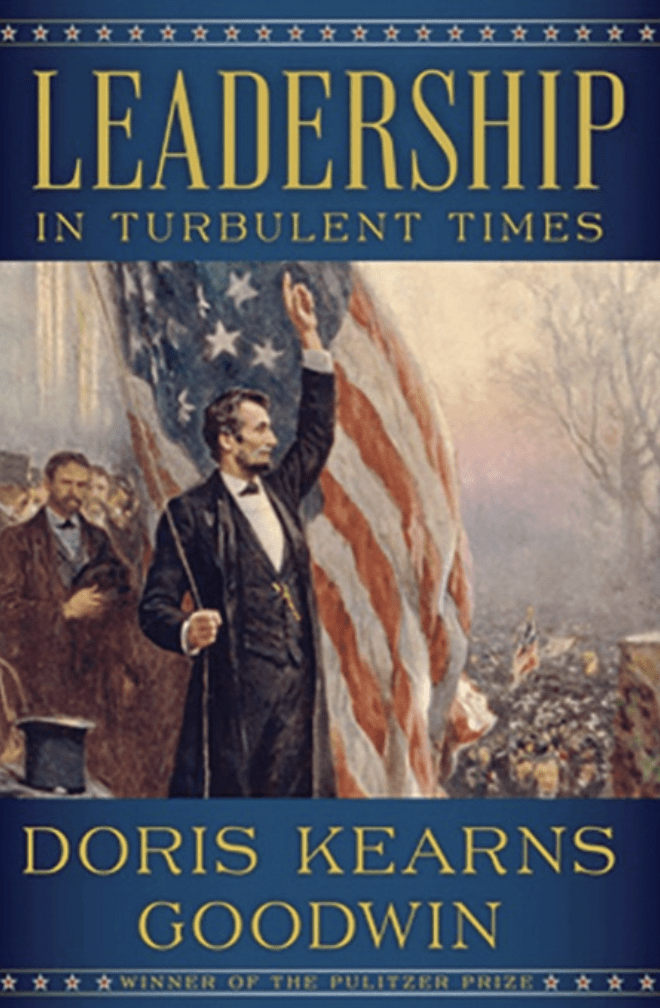Leadership in Turbulent Times: When Presidents Fought Chaos

By Doris Kearns Goodwin
Simon & Schuster, 2018.
Review by Lisa Van Dusen
October 29, 2018
First, a disclaimer: If you’re looking for a tale of Survivor-style, hair-on-fire office politics, reality-show melodrama and casual tyranny, this isn’t the book for you. For that, you want Michael Wolff’s Fire and Fury or the more forensic but equally bloodcurdling Fear by Bob Woodward.
Luckily, you don’t need to read an entire book about Donald Trump’s implausible presidency for the ton-of-bricks contrast between the current occupant of the White House and the presidents whose leadership qualities are deconstructed in this book to hit you on every page.
Abraham Lincoln, Theodore Roosevelt, Franklin Delano Roosevelt and Lyndon Johnson were neither perfect men nor perfect presidents. The contrast begins from the lowest common denominators that none of them ever suggested the U.S. government print money to lower the debt, claimed that trade wars are good and easy to win or toyed with appointing his own daughter to the second-most important post in U.S. diplomacy. It may as well end with the fact if any of them was a compulsive, unsolicited grabber of women’s pelvic parts, he never bragged about it into a hot mic.
Among the advantages to corrupting and hacking democracy, if you’re into that sort of thing, is that it allows the otherwise unelectable to obtain power for the interests who’ve secured it for them, financially or otherwise. When power can be obtained through mass manipulation, disinformation, corruption and other covert tactics, the prerequisites of character are reversed, and success becomes the province of bad people willing to do anything it takes to fool voters instead of good people with a positive argument to make, take it or leave it. The predetermined outcomes of corrupted democracy preclude the need for instinct, talent, relatability, empathy, integrity, intellect and skill, which makes this book a sort of valentine to the uncorrupted kind.
The presidents in Goodwin’s book are all basically good people; men of ambition, some more noble than others (in the ambition breakdown of desire to do good vs. lust for power, Johnson may tilt most toward the latter) but all of them individuals who loved their country, and whose unique combination of experience and personality seemed tailored for the particular moments of crisis in which they governed. In Lincoln’s case, it’s hard to imagine a leader who could have accomplished what was arguably the greatest feat of transformational leadership in U.S. history without his peculiar combination of temperament, generosity of spirit and ability to communicate.
All four shared the quality of having lived through dramatic reversals of fate from which they emerged better, more empathetic men, even if some coped with the psychological strain of setbacks and loss more effectively than others: Lincoln and Johnson’s bouts of major depression humanize them; FDR’s triumph of mind over matter and empathy over privilege in literally getting the better of polio by transcending it to embrace humility, help others and strengthen his resilience made him precisely the man and the president he was. The fact that Lincoln would alleviate the colossal stress of the Civil War with regular trips to the theatre is no less endearing for its fateful irony.
In the end, the true contrast isn’t between these men and the one currently occupying the White House, it’s between functioning democracy and compromised democracy. Functioning democracy produces leaders who end slavery, not start it; who elevate their country, not degrade it; who exhibit love, not contempt for their fellow human beings; and who strengthen civil rights and human rights, not weaken them. American democracy, in its uncompromised state, has produced some of the world’s great leaders. This book reminds of us that.
Above all, at a time when so much of the content that crosses our screens reflects an agenda to normalize the patently abnormal and rationalize the utterly irrational, Goodwin’s only agenda is to deploy her moral compass to measure these men and impart the lessons of their lives. In that way, she comes through on every page, like a fifth leader.
Lisa Van Dusen is associate editor of Policy Magazine and a columnist for The Hill Times. She was Washington bureau chief for Sun Media, a writer for Peter Jennings at ABC News, and an editor at AP in New York and UPI in Washington.
